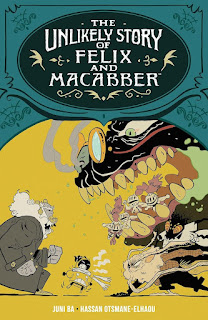I think The Unlikely Story of Felix and Macabber doesn't quite explain all of the things it should have - but it's close, and some readers might find the way it implies its world is just fine. So let me just note that, and note that this is writer Hassan Otsmane-Elhaou's first graphic novel, and point out that traditionally ties go to the runner.
I have no quibbles about the art by Juni Ba, which is detailed in quirky, grotesque ways that fits this world perfectly. Also, I should say that the lettering is by Otsamane-Elhaou - the sound effects are particularly fun, and he makes the captions and dialogue slightly italic to give the book a distinctive look, too.
I don't know if this book is specifically for younger readers, but it has a vibe that upper-elementary-school kids will probably enjoy, and the professional-wrestling influences also tend to make the violence stylized and bloodless in ways that are young-reader-friendly.
We're in a world of monsters - think Monsters, Inc., where everyone is a slightly different kind of creature, and you'll be close - where strength and fighting ability seem to be prized above all other traits. (Or, at least, this story deals with that side of this world.) A young, small monster named Felix is timid, bullied by a gang of other monsters from his school. They dare him to ring a random doorbell; he does. A craggy old monster answers the door, and seems to want to talk to this random small interloper for reasons that are never clear. He grabs at Felix, who runs away immediately, and loses his backpack to the old guy.
This is all heavily narrated, mostly in ways that tell us things we can already see on-panel rather than adding detail to the world - it's a very story-book voice, as if telling the story many years later.
Anyway, Felix is bullied at school and browbeaten by his parents and denigrated by his teachers: he's the usual mousy little guy who needs to learn to stick up for himself. In trying to get his backpack back, he accidentally stows away in the old guy's car - I suppose I should make it clear that the old guy is Macabber, the other half of the title - as he goes back to the town of his birth.
Macabber is the former World Champion of Monstering, hugely dominant in his era. Monstering is basically pro wrestling, only in a society of monsters where everyone has completely different bodies from each other. He left this town to go off for the big fights, leaving his former best friend behind. He never returned - until now, of course - in however many years it's been.
The town is a dump now, which everyone living there blames Macabber for. There's no reason for this I can figure out: it's a weird mix of "you're supposed to support the old neighborhood" and "you left us behind." And everyone is much more likely to resolve interpersonal conflicts by punching rather than talking about things, which may be one reason why we don't get any clear, or convincing, explanations.
Anyway, the local hooligans - little guys in knight's armor - find and harass and then recruit Felix, again for murky reasons. Macabber meets his once-best friend, sort-of apologizes for having a successful career elsewhere, and feels guilty. We get a lot of flashbacks to Macabber's fighting career, which was zippy and action-packed.
That portion of the story doesn't exactly resolve, but we flash forward suddenly, to see that Felix also goes into Monstering, and is even better at it than Macabber was - we get a few of his fights, too - but we mostly see him at the end of his career, rich and successful and done with it all.
Felix does not seem to have run away from any towns, or beaten up any of his best friends to do so, or run his career in any ways that would make us dislike him. But he has the same sad attitude at the end of his career Macabber did - not sad because it's over, not sad because he stomped over people to get there, but just generally sad because he's not sure if he's a good or bad person, I guess.
I want to say that the lesson Unlikely Story is trying to make - or the lesson it comes closest to making - is that fighting people for a living is a bad idea; that violence is never the answer, little trooper. But it's so clearly a book about how Monstering is fun and exciting and awesome that doesn't really seem to fit.
So I'm puzzled by Unlikely Story. It seems to want to give me a Lesson About Life, but its two characters are not parallel in any ways that reinforce the Lesson it seems to want to push. What they have in common, at the end of their careers, is a habit of speaking in vague circumlocutions - this may be more Otsmane-Elhaou's writing style - and a sense that they are sad because it's all over and they're no longer Monstering Champion of the World anymore, which, um, yeah, would be sad, wouldn't it?

No comments:
Post a Comment